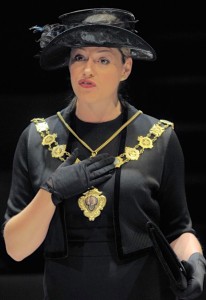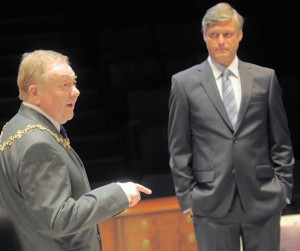Alan Ayckbourn’s plays have been a fixture of the Brits Off Broadway Festival for several years. This year, along with a revival, the festival is presenting the world premiere production of Hero’s Welcome, first seen at Ayckbourn’s own Stephen Joseph Theatre in Yorkshire, England, and now on an international tour.
Ayckbourn, the author of 79 plays, may be one of the most underrated playwrights alive. Many of his works are comedies, but there are often dark underpinnings. From his classic Absurd Person Singular (1975), in which a hilarious attempted suicide takes up the entire second act, to Arrivals & Departures (2013), one of his darkest, he has been a masterly commentator on British society in plays that range from science fiction (Comic Potential, Communicating Doors) to astute social observation (Things We Do for Love, Absent Friends)—always using comedy to make his points.
Unlike many Ayckbourn plays, Hero’s Welcome feels a bit long and complicated. Opening with Elgarian music and a TV interview, it concerns a soldier named Murray (Richard Stacey) who has returned to his small home town to take up residence with his new wife, a woman from the unidentified foreign country in which he conducted his heroic deeds. Her name is Madrababacascabuna, but she goes by Baba. The interview elicits a confession from Murray that he left under a cloud; he was “a bit of a tearaway,” as his interviewer puts it. As Ayckbourn’s play unfolds, it becomes clear that the heroes in the play are the three wives we see; their husbands are cruel or ineffectual. The mayor of the town, Alice (Elizabeth Boag), was abandoned at the altar by Murray. Now she is matched with a kind-hearted duffer named Derek (Russell Dixon), who plays with toy trains all over their house, and who describes himself as a “consort.”
Murray’s old mate Brad, meanwhile, is married to Kara. But the upper-class, wealthy Brad refuses to acknowledge that he and Murray were close childhood friends. The competitive Brad is, in Wodehousian terms, a blackguard. He repeatedly insults Charlotte Harwood’s cheery, giggly Kara, and she accepts it.
Murray hopes to resurrect the family business, an old hotel called the Bird of Prey. It’s listed as historically important but is rundown. Moreover, Murray’s father couldn’t pay the taxes on it, and now it belongs to the town council, and Alice is bent on tearing it down. Although she’s not vicious, it suits her impulse for revenge to prevent Murray’s buying back the property.
Ayckbourn’s play is about the public faces people put on that conceal their private personalities, and how the past shapes those personalities. Just as Kara remains chirpy in order not to recognize Brad’s cruelty, Brad himself is cruel in order to forget his lack of courage in throwing over a woman he loved in the face of his parents’ threat of disinheritance. Murray, meanwhile struggles with some bad behavior of his own. In addition to jilting Alice, his heroism is a sham.
It’s often unwise for an author to direct his own work, but in the past Ayckbourn has proved the rare exception to the rule. This time, though, the play feels a bit longer than it need be, and a bit overstuffed with incident. What a different director might have done to tighten it is uncertain, but the actors, at least, are outstanding. Stephen Billington’s Brad is all surly arrogance, and Boag’s Alice is stiff and competent, but frosty from a life of suspicion sparked by her jilting. Dixon is a comic pleasure, and Derek’s rising to his Lochinvar moment, when he excoriates Brad, is deeply satisfying. Stacey’s Murray is perhaps the least interesting character—he’s not the hero of the title, since it’s an ensemble piece—but he conveys decency, modesty and honest regret.
Still, it’s Evelyn Hoskins’ Baba who is first among equals. Learning English slowly and painstakingly, bravely facing a future in as a refugee, ultimately befriending Kara and confronting Alice, Baba’s journey becomes the play’s real focus. Early on, after she has met the people from Murray’s past, she asks him: “Why they hate you?” Like Winnie in the Ayckbourn masterpiece My Wonderful Day (2009), she knows the truth that others cannot see.
Two Alan Ayckbourn plays, Hero’s Welcome and Confusions, run in repertory through July 3 at the Brits Off Broadway Festival at 59 East 59 St. between Park and Madison. Tickets are $70 but two-show packages are available. For information, visit 59e59.org.








